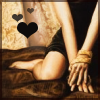-
Content count
3 -
Joined
-
Last visited
Posts posted by volcaniclastic
-
-
I've taken a recent interest in taoism, and I'd like to incorporate it from a pagan perspective. But where do I start?
You cannot read about the Tao, you must be the Tao. You can't describe the Tao, you must experience the Tao (blah, blah, blah)...but how am I to do this if I don't know what taoism is first?
I've read Tao of Pooh (twice, in the last two days) - and there is definitely something to be desired in Taoism, in my opinion. Is the Tao Te Ching hard to read?
I've browsed the site, but there is so much. Some starting points would be appreciated.
Thanks!
-


New to Taoism
in General Discussion
Posted
I hadn't thought of it that way before. Tao doesn't seem so great and mysterious that way.
I'll take a look for it next time I'm at the bookstore. Mind, I may have to buy it online - the Taoism section of the bookstore nearby is only a half shelf worth of books.
I found a version online last night and printed it, translated by S. Mitchell. I don't recall what website I found it at, but I've read a few chapters of it so far. Also, I found an online copy of the TTC - a modern translation by Ron Hogan, which pretty much takes the TTC and paraphrases it into something more modern and understandable. Example:
Chapter 1:
If you can talk about it,
It ain't Tao.
If it has a name,
It's just another thing.
Tao doesn't have a name.
Names are for ordinary things.
Stop wanting stuff,
It keeps you from seeing what's real.
When you want stuff,
All you see are things.
Those two sentences mean the same thing.
Figure them out,
and you've got it made.
Some of his translations are actually pretty funny. And I've found it helpful to read the original chapter, and then read his chapter - it makes more sense that way.
But I will definitely pick up the Tao of Daily Living next time I get a chance. Do you know if the Idiot's Guide to Taoism is any good?